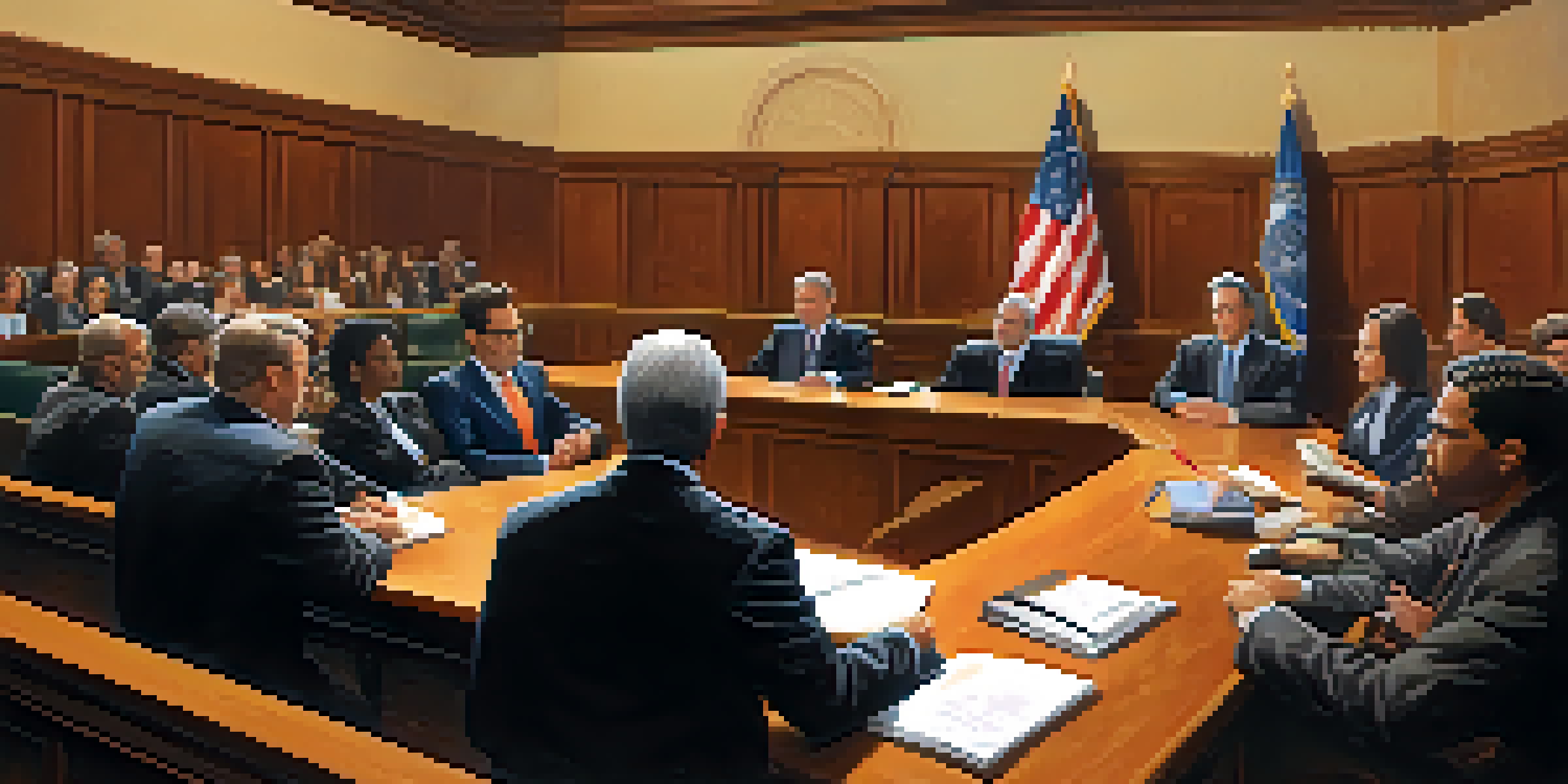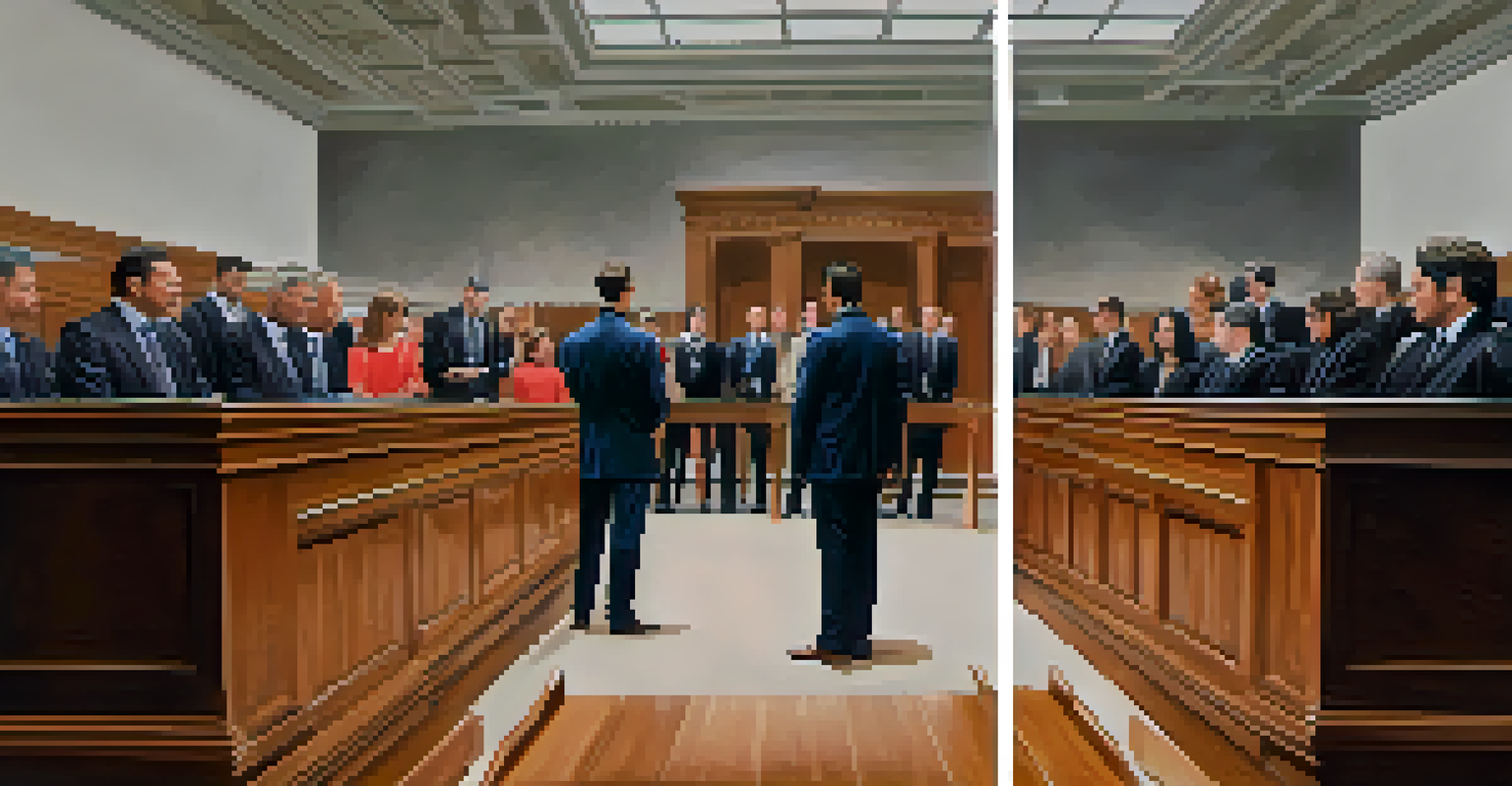The Impact of Social Media on Self Defense Cases in Court

Understanding Self Defense in Legal Terms
Self-defense is a legal doctrine that allows individuals to use reasonable force to protect themselves from imminent harm. In court, the justification for this defense can be complex, often hinging on the circumstances and perceptions of the moment. It’s crucial for juries to understand the context of an incident, which can be complicated by outside influences, including social media.
The greatest danger in times of turbulence is not the turbulence; it is to act with yesterday's logic.
When a self-defense case goes to trial, the evidence presented must convincingly demonstrate that the accused acted reasonably under the threat they perceived. However, social media can complicate this narrative. Posts, comments, and videos shared online can alter perceptions, leading jurors to form opinions that may not align with the factual evidence presented in court.
Ultimately, the legal definition of self-defense is nuanced, and social media's role can introduce biases that affect the case's outcome. As such, understanding both the law and social media's influence is essential for anyone involved in legal proceedings.
The Role of Social Media in Public Perception
Social media platforms are powerful tools that shape public perception, often in real-time. When an incident occurs, videos or posts can go viral, quickly influencing the opinions of potential jurors even before a case reaches court. This immediacy can create a narrative that may not accurately reflect the truth of the situation.

For example, an altercation captured on video may be edited or presented with misleading commentary, skewing the public's understanding. This distorted perception can seep into the courtroom, where jurors may come in with preconceived notions based on what they've seen online. The challenge for attorneys is to counteract these narratives and present a clear, factual account of the events.
Self-Defense and Legal Nuance
Self-defense is a complex legal doctrine that requires a careful examination of the circumstances surrounding an incident.
Moreover, public opinion can also pressure legal decisions, with prosecutors and defense attorneys feeling the heat of social media scrutiny. This interplay underscores the importance of managing the narrative surrounding a case, making social media a double-edged sword in legal contexts.
How Social Media Evidence is Used in Court
In many self-defense cases, social media evidence can be both beneficial and detrimental. Text messages, posts, and images may provide context that supports a defendant’s claims of fear or threat. For instance, a history of harassment or threats documented online can bolster a self-defense argument by illustrating a pattern of behavior.
In the age of information, ignorance is a choice.
Conversely, social media evidence can also be used against a defendant. Posts that showcase aggressive behavior or boastful remarks about past fights can undermine claims of acting in self-defense. This duality makes it imperative for individuals involved in self-defense cases to be aware of their online presence and how it might be interpreted in court.
Judges may allow this type of evidence if it is relevant to the case, which means that social media activity can play a significant role in shaping the outcome. As social media continues to evolve, its implications for legal cases will undoubtedly grow.
Influence of Social Media on Jury Selection
Jury selection is a critical phase in any trial, and social media has introduced new dynamics in this process. Potential jurors can be researched online, allowing attorneys to gauge their biases and attitudes based on their social media activity. This can help legal teams select jurors who are more likely to be sympathetic to their case.
However, this practice also raises ethical questions about privacy and the extent to which jurors can be scrutinized. It creates a situation where jurors may feel pressured to edit their online personas to appear more favorable, which complicates the authenticity of jury selection. The implications of this trend can be significant for both defense and prosecution teams.
Social Media's Impact on Trials
Social media can significantly influence public perception and juror opinions, complicating the legal process.
As social media continues to permeate everyday life, its influence on jury selection will likely grow, making it essential for legal professionals to adapt their strategies accordingly.
The Challenge of Misinformation on Social Media
Misinformation spreads rapidly across social media, posing a significant challenge for self-defense cases. False narratives can quickly circulate, leading to public outcry or support that may not be rooted in facts. This can create a hostile environment for defendants, who may struggle to receive a fair trial amid the chaos of online commentary.
For instance, if a story about an incident is misreported or sensationalized, it can lead to a biased public perception that influences jurors. This is particularly concerning in high-profile cases where emotions run high and the media spotlight is intense. Jurors may inadvertently be swayed by misinformation, affecting their decisions.
Legal teams must navigate this landscape carefully, often working to dispel false narratives before they can take root. Clear communication and factual evidence become paramount in combating the effects of misinformation in the courtroom.
Using Social Media for Defense Strategies
Interestingly, social media can also serve as a valuable tool for defense strategies in self-defense cases. Attorneys can use social media to gather evidence, identify witnesses, and compile information that supports their client's narrative. By analyzing posts and interactions, they can construct a comprehensive picture of the events leading to the incident.
Moreover, defense teams can utilize social media to manage public perception proactively. They can create campaigns that highlight their client's side of the story, countering misleading narratives that have emerged online. This approach not only aims to influence public opinion but also to ensure that jurors come to court with a more balanced perspective.
Future of Social Media in Law
As technology advances, the role of social media in legal proceedings will continue to evolve, necessitating greater digital literacy among jurors.
In this way, social media transforms from a potential threat into an ally, enabling legal teams to bolster their case effectively. The strategic use of these platforms can be a game-changer in achieving a favorable outcome.
The Future of Social Media in Legal Proceedings
As technology evolves, so too will the role of social media in legal proceedings, particularly in self-defense cases. The rise of new platforms and communication tools means that the ways in which evidence is gathered and presented will continue to change. Legal professionals must stay ahead of these trends to effectively navigate the complexities they introduce.
Looking forward, there may be greater emphasis on digital literacy among jurors, who will need to critically assess the information they encounter online. This shift could lead to more informed juries that understand the nuances of social media and its implications for justice. Training programs may emerge to help jurors navigate these challenges more effectively.

Ultimately, the intersection of social media and the legal system will continue to be a dynamic and evolving landscape. As both fields adapt, it will be vital for those involved to remain aware of the potential impacts and opportunities presented by social media.